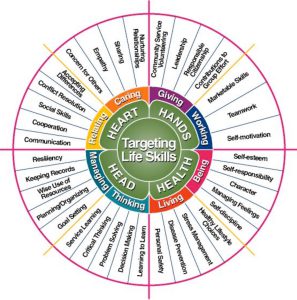Life skills, what are they?
Life skills are the knowledge and abilities that individuals adapt to function in their living environment. For example, how to communicate is a BIG life skill. The main language spoken in each household is frequently the first language a child will learn. Another example of a common life skill is how to feed oneself. Some households rely on instant and ready-made meals to feed themselves; others raise their own crops and livestock to harvest and create meals from scratch. How and where we live directly impacts which life skills we pick up and maintain into adulthood.
As represented through the 4-H pledge, 4-H teaches life skills through the four “H’s:” Head, Hands, Heart, and Health.
” I pledge my HEAD to clearer thinking,
my HEART to greater loyalty,
my HANDS to larger service,
my HEALTH to better living,
for my club, my community, my country, and my world. “
According to Dr. Hendrick’s Life Skills Model, life skills can be broken into those four main “H‘s”
-
HEAD
- Goal setting
- Record keeping
- Gaining new vocational/technical skills
-
HEART
- Empathy
- Participating in club and county events
- Caring for livestock

Hendricks, P. (1998) “Developing Youth Curriculum Using the Targeting Life Skills Model”
-
HANDS
- Gardening
- Sewing
- Community Service projects
-
HEALTH
- Sense of community and belonging
- Caring youth-adult partnerships
- Healthy lifestyle choices
Why is this important?
Learning life skills in childhood and adolescence is important to set youth up on a path to grow into thriving adults. Well-known psychologist, Dr. Benson once stated that out of 80 million children, only one quarter of those youth upon entering high school are set up to become thriving adults when they graduate. 4-H captures youths’ interest through different clubs, programs, camps, and events. It is the fun activities and sense of belonging that keep youth participating in 4-H year after year, giving those youth access to learn the valuable life skills they need to thrive.
For more information on life skills and 4-H, visit : 4HS FS101./4H242: Targeting Life Skills in 4-H (ufl.edu)
For more information on the Broward County 4-H program, visit: Broward 4-H Youth Development – UF/IFAS Extension (ufl.edu)
If you know of a youth who would like to join Broward County 4-H, email broward4h@ifas.ufl.edu.
 2
2


